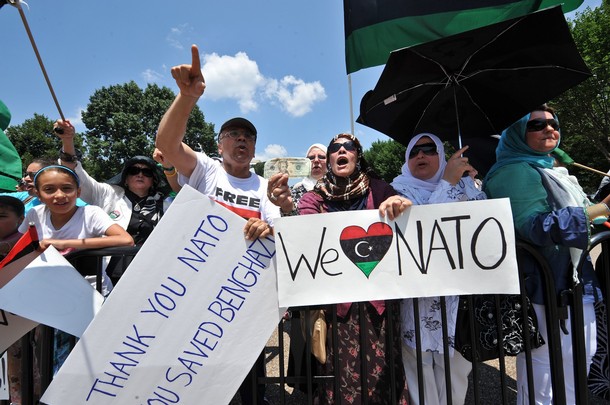
From Nikolas Gvosdev, the Realist Prism: Is it time for NATO to begin wrapping up its Libya operation? The observance of Ramadan will begin in a few days, and even though Islamic tradition permits those involved in combat to be exempted from the requirements of the fast, most analysts expect a dramatic slowdown in major combat operations on the part of both pro-Gadhafi and anti-government forces during August. While NATO spokesmen have indicated that sorties will continue to be flown during the holiday, the pace of combat will lessen. This, in turn, may reinforce conditions on the ground, which Chairman of the Joint Chiefs of Staff Adm. Mike Mullen characterized earlier this week as a "stalemate." And that was before the death under mysterious circumstances of former Interior Minister Abdul Fatah Younis, who was serving as overall military commander of the rebellion, raised the possibility that splits in rebel ranks might complicate the efforts to overthrow Moammar Gadhafi.
Even if the conflict picks up steam again after Ramadan ends on Aug. 30, the alliance will then have to confront a new deadline: The NATO mission’s mandate will draw to a close on Sept. 27 unless it is explicitly renewed or extended, a decision that would require unanimous consent of all the alliance’s members. Enthusiasm for the operation was never that strong among key NATO states such as Germany and Turkey, and public support for the mission in Britain and France has been eroding. French President Nicolas Sarkozy will want to bring operations to a successful close well in advance of the April 2012 presidential contest, while the government of British Prime Minister David Cameron will want to be in a position to proclaim that the conflict is winding down by the time it must again submit the biannual "bill" for the Libya operation to parliamentary scrutiny.
In Washington, increasingly focused on spending issues, the news that the costs for the Libya war have now surpassed $1 billion — 75 percent of which has been funded by the American taxpayer — will not endear the operation to members of Congress contemplating drastic cuts in social services and unwelcome tax increases as a way to staunch the country’s flood of red ink. . . .
The Libya operation was launched under the premise that it would be a short victorious war. As those assumptions have not panned out, there is a clear effort underway to make sure it does not become a long, hard slog.
Nikolas K. Gvosdev is the former editor of the National Interest, and a frequent foreign policy commentator in both the print and broadcast media. He is currently on the faculty of the U.S. Naval War College. The views expressed are his own and do not reflect those of the Navy or the U.S. government. His weekly WPR column, The Realist Prism, appears every Friday.
Image: getty%207%2031%2011%20Pro%20NATO%20demonstrators.jpg
